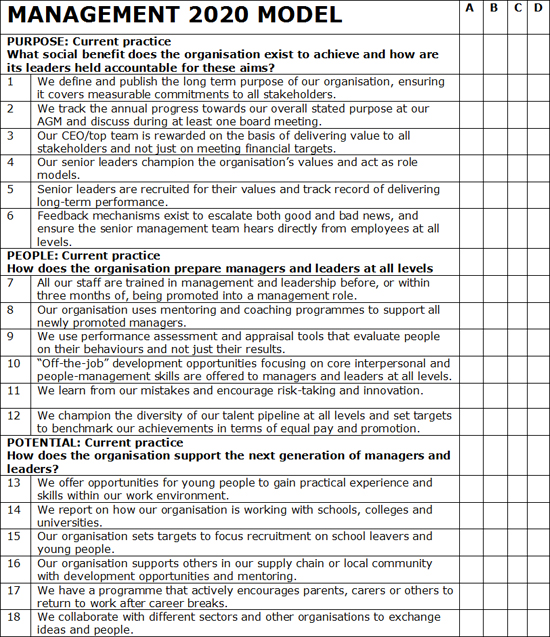
In 2013 the All Party Parliamentary Group on Management (APPGM) decided to investigate how management and leadership in the UK will need to change by 2020 to deliver sustainable economic growth. They proceeded to set up The Commission on the Future of Management in conjunction with the Chartered Management Institute (CMI). The Commission published its findings in July 2014 which set out the six main challenges facing the UK, together with a self-assessment model to measure current practice.
The six main challenges they identified were:
The UK lags behind many competitors on key economic indicators
Productivity is 21% lower than that of the rest of the G7 and measures of management performance are similarly lower than those of many rivals. Time wasted by poor management could be costing the economy as much as £19bn a year.
Younger generations will drive new ways of working
“Generation Y” and “Millennials” will make up 75% of the workforce by 2025. Their expectations about the employment relationship and ways of working demand new approaches. There are also major employability challenges for young people in the UK.
Managers will need to be adequately trained
Government data shows that the UK labour market will need one million new managers by 2020, yet 71% of the leaders surveyed by CMI confess they could do better at training first-time managers, or do not train them at all. This could leave 150,000 employees a year taking on management roles without adequate preparation.
Technology demands better people skills
New technology not only demands new technical skills but requires increased connectivity between people and puts a premium on managers’ personal, communication, net-work building and collaboration skills.
Globalisation will drive diversity and more cross-cultural working
More organisations will operate across borders and need to navigate cultural differences, but too few young people take opportunities to study and work abroad.
Long-term sustainability is fundamental
The global economic crash exposed the danger posed by short-termism in management thinking and incentives. But those who cut costs and overheads still seem to earn more respect than those who take the riskier, more innovative paths that lead to growth in revenue, profits and jobs. Leaders need to define their organisation’s long-term purpose and resist pressure for short-term results.
So, how does your organisation measure up to these challenges? Take the test and score yourself:
A = Not applicable
B = We are poor at this or do not do it
C = We do this but could do it much better
D = We are good or very good at this



